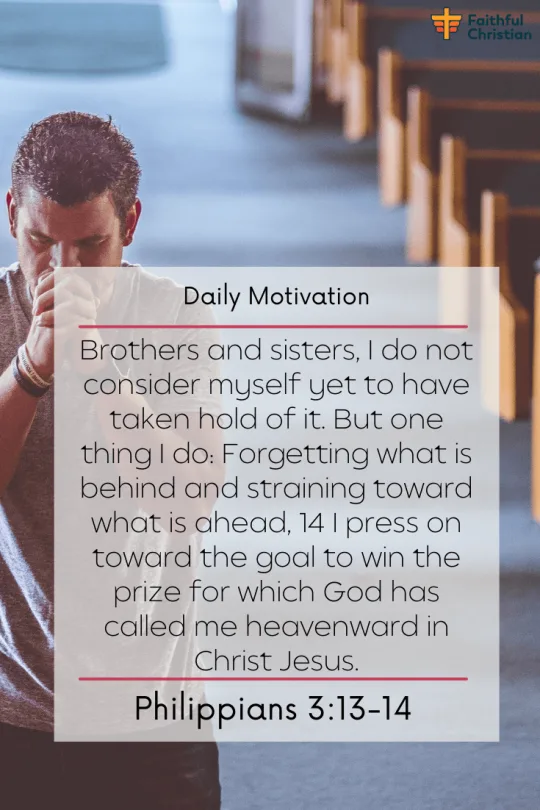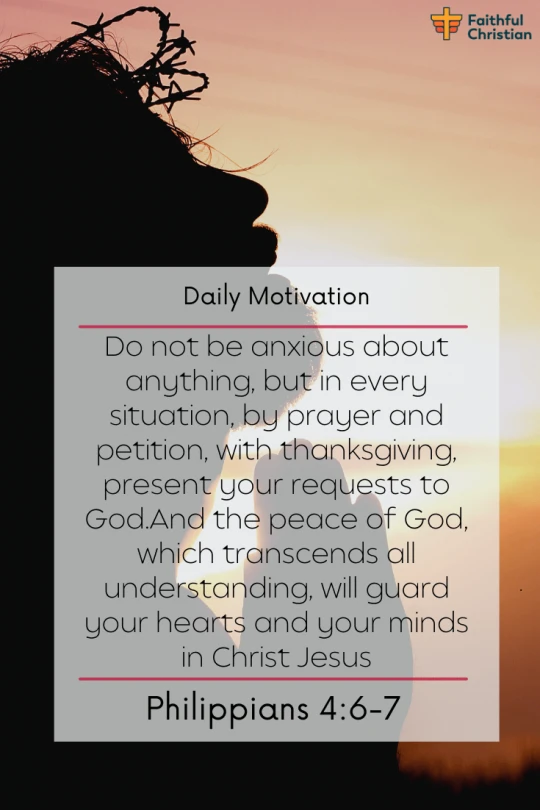Navigating life’s challenges often requires us to let go and move on, embracing new beginnings and leaving the past behind.
The Bible serves as a powerful resource, offering encouragement and wisdom to help us navigate these transitions with grace and strength.
In this blog post, we’ll explore Bible verses focused on letting go and moving on, providing spiritual guidance for those seeking to heal, grow, and embrace change.
“Trust in the Lord with all your heart; don’t rely on your own wisdom.” (Proverbs 3:5)
Join us on this enlightening journey. We’ll delve into scripture’s timeless wisdom.
Let go, move forward, and trust in God’s unwavering love. Embrace the power of change with confidence and grace.
Recommended for you
- Powerful Scriptures about trusting God
- Powerful Prayer for anger Bible verses
- Prayer to let go and let God
- Romans 8:28 Explained
Bible verses about letting go

1. Philippians 3:13-14 NIV

Brothers and sisters, I do not consider myself yet to have taken hold of it. But one thing I do: Forgetting what is behind and straining toward what is ahead, I press on toward the goal to win the prize for which God has called me heavenward in Christ Jesus
Philippians 3:13-14 encourages us to leave the past behind and focus on the future. In this article, we’ll explore applying this scripture using related verses and examples from the Bible and modern times.
Hebrews 12:1-2 tells us to “run with perseverance the race marked out for us, fixing our eyes on Jesus.” Like a determined runner, we mustn’t let past mistakes distract us. Focusing on Jesus provides strength and resolve to keep moving.
In 2 Corinthians 5:17, Paul says, “if anyone is in Christ, the new creation has come.” Embracing faith in Jesus means our past failures don’t define us. We can start fresh and pursue our God-given potential.
Trusting God’s plan for our future can be challenging. Joseph’s story in Genesis 50:15-21 illustrates this. Sold into slavery by jealous brothers, Joseph remained faithful.
He eventually became a leader in Egypt, forgiving his brothers. This story shows that even when life takes unexpected turns, God can bring good out of it.
Our faith in God can motivate us to move forward. Corrie ten Boom’s story exemplifies this. Imprisoned in a concentration camp for helping Jews during World War II, Corrie’s faith sustained her.
She eventually forgave her captors, showing how faith can help us overcome obstacles.
Perseverance is crucial when facing adversity. James 1:12 states, “Blessed is the one who perseveres under trial.”
Relying on God’s strength and staying committed to our faith helps us overcome challenges and leave the past behind.
In summary, Philippians 3:13-14 tells us to let go of the past and focus on the future.
Trusting in God’s plan, finding motivation in our faith, and persevering through trials helps us move forward and embrace the life God has prepared for us.
2. Isaiah 43:18-19 NIV

“Forget the former things; do not dwell on the past. See, I am doing a new thing! Now it springs up; do you not perceive it? I am making a way in the wildernessand streams in the wasteland
Isaiah 43:18-19 offers powerful hope. It tells us that God creates new beginnings. Embracing change can be tough. But it’s essential for our growth.
These verses remind us of God’s transformative power. In 2 Corinthians 5:17, we learn that in Christ, we become new creations.
Lamentations 3:22-23 shows us God’s endless compassion. His faithfulness renews daily. We can trust God to guide us through change.
Embracing change is vital. It’s part of God’s plan. By accepting it, we allow Him to shape us. We can become who He wants us to be. Letting go of our fears opens us to blessings.
God is amazing. He creates beauty from ashes. He can turn difficult situations into something incredible. Trusting His power leads to transformation. Letting go of past hurts allows God to heal and renew us.
Saul’s conversion to Paul (Acts 9:1-22) demonstrates this. Once a persecutor of Christians, Saul met Jesus and changed. He became an influential apostle.
Like Saul, we can let go of our past and allow God to create new beginnings.
In modern times, Nick Vujicic’s story inspires us. Born without limbs, he overcame challenges. He became a motivational speaker and evangelist. His journey shows the power of letting go and trusting God’s plan.
Renewal and transformation come through faith. Trusting God leads to a deeper relationship with Him. This process creates a life full of purpose, joy, and peace.
In conclusion, Isaiah 43:18-19 encourages us to embrace change. Trust in God’s ability to create new beginnings. Doing so opens us up to blessings and transformation. With God, nothing is impossible. The best is yet to come.
3. Matthew 6:14-15 NIV

For if you forgive other people when they sin against you, your heavenly Father will also forgive you. But if you do not forgive others their sins, your Father will not forgive your sins
The power of forgiveness is vital in our lives, shaping our relationships with God and others. Delving into Matthew 6:14-15, we discover the deep connection between forgiveness, letting go, healing, and personal freedom.
Exploring Bible verses on forgiving others and scriptures about forgiveness and healing reveals the profound impact forgiveness has on our lives.
Forgiving others is not only morally essential, but it’s also crucial for moving on. When we cling to resentment, it weighs us down and blocks our path to peace and progress.
Matthew 6:14-15 highlights the need for forgiveness, as it’s the key to receiving God’s pardon. Releasing our grievances unlocks opportunities for growth, healing, and a stronger bond with God.
Grudges can hold us captive in cycles of anger and bitterness. Choosing to let go and forgive liberates us from these emotional shackles.
Colossians 3:13 urges us to be compassionate and forgiving, just like Christ. This act of release paves the way to true freedom, healthier relationships, and a more fulfilling life.
Jesus makes it clear in Matthew 6:14-15 that forgiving others leads to our own forgiveness from the Heavenly Father. This link highlights the significance of extending forgiveness to those who have hurt us.
Ephesians 4:31-32 encourages us to replace bitterness and anger with kindness and empathy. In doing so, we cultivate a receptive heart for God’s forgiveness and grace.
Forgiveness is not a one-time act; it’s a daily choice. Every day presents new challenges, requiring us to continually let go of grievances and forgive others.
This ongoing practice nurtures a compassionate and understanding heart that mirrors God’s character.
Healing—emotionally and spiritually—flows from forgiveness. When Jesus forgave the woman caught in adultery (John 8:1-11), he freed her from her sin and offered her a fresh start.
We too can find healing through the act of forgiving others.
Nelson Mandela’s reconciliation efforts in South Africa demonstrate the transformative power of forgiveness. Despite 27 years in prison, he forgave his oppressors, paving the way for unity and healing in his country.
In summary, forgiveness is essential for letting go, healing, and progress. By following Matthew 6:14-15 and related scriptures, we can achieve freedom, peace, and growth through a forgiving heart.
Regularly practicing forgiveness and acknowledging its healing effect significantly influences our lives and the lives of others.
4. Romans 8:28 NIV

And we know that all things work together for good to them that love God, to them who are the called according to his purpose
Romans 8:28 offers us a strong message of hope in our lives. It reassures us that “all things work together for good to those who love God, to those who are called according to His purpose.”
In an ever-changing world, we can find comfort knowing that God has a purpose for us and remains in control.
Challenges in life can make us question God’s goodness. Yet, Scriptures like Jeremiah 29:11 remind us of God’s intentions for our well-being.
By trusting His plan, we can release our fears and anxieties, confident that He’s working it all out for our ultimate good.
We often hold on to our plans and desires, leading to frustration and disappointment. Proverbs 16:9 says, “In their hearts, humans plan their course, but the Lord establishes their steps.”
For true peace and fulfillment, we must let go of our plans and trust God’s wisdom.
The story of Ruth demonstrates God’s presence during tough times. Ruth, a Moabite widow, followed her mother-in-law Naomi to Bethlehem. Despite adversity, God led Ruth to Boaz, a kind man.
Ruth and Boaz married, their union becoming part of the lineage leading to King David and Jesus Christ (Ruth 1-4). This example highlights God’s guiding hand in difficult moments.
Joni Eareckson Tada is a modern faith example. A diving accident at 17 left her paralyzed. Instead of despairing, Joni trusted God’s sovereignty and used her situation to inspire others.
Her ministry has impacted millions, sharing God’s love and hope amidst adversity.
Throughout life, we must hold on to God’s promises. Immersing ourselves in Bible verses about trusting God’s plan and letting go brings hope and encouragement.
When facing challenges, remember Romans 8:28 and find solace in God’s work for our good.
In conclusion, Romans 8:28 teaches us to trust God’s plan, let go of our desires, recognize His presence in struggles, believe in His sovereignty, and find hope in His promises.
Embracing these truths leads to a life of peace, joy, and fulfillment centered on God’s purpose.
5. Psalm 46:10-11 NIV

Be still, and know that I am God: I will be exalted among the heathen, I will be exalted in the earth.The Lord of hosts is with us; the God of Jacob is our refuge. Selah
In a noisy, chaotic world, Psalm 46:10-11 serves as a powerful reminder. It teaches us the value of stillness and trust in our relationship with God. These verses invite us to pause, release our worries, and find peace in His presence.
God’s presence is a sanctuary from life’s storms. It’s a place of solace and tranquility. As we grow aware of His presence, we find refuge. We can unload our burdens, quiet our minds, and experience deep, lasting peace.
We often rely on our own strength, trying to face challenges alone. But Psalm 46:10-11 urges us to trust in God’s power. By doing so, we can experience freedom.
We come to trust in His love, wisdom, and strength to see us through.
In today’s world, stillness is often overlooked. Yet, quiet moments help us truly connect with God. By making time for stillness, we deepen our bond with our Creator and find renewed strength in His presence.
Exodus 14:14 reminds us, “The Lord will fight for you; you need only to be still.”
During uncertain or dangerous times, anxiety and fear are natural. Yet, Psalm 46:10-11 assures us that God is our fortress.
He offers safety and protection. Trusting in Him, we can face life’s challenges with confidence, knowing He guides us and watches over us.
Isaiah 40:31 reinforces trust, saying, “But those who hope in the Lord will renew their strength. They will soar on wings like eagles; they will run and not grow weary, they will walk and not be faint.”
Trusting God takes patience and faith, especially in tough times. Practicing stillness and focusing on God helps us develop resilience and perseverance.
David, the future king of Israel, found refuge in God while fleeing from King Saul. Despite danger and uncertainty, David’s trust in God remained steadfast. He composed many Psalms that continue to offer comfort and hope.
Mother Teresa, a modern-day saint, displayed stillness and trust in her work among India’s poor.
Amidst daily suffering and heartache, she found strength in her deep relationship with God. She often sought stillness and contemplation in the presence of the Eucharist.
In summary, Psalm 46:10-11 highlights the significance of stillness and trust in our connection with God.
By releasing our own strength, embracing quietness, and relying on God’s guidance, we attain peace, strength, and resilience.
Proverbs 4:25-27 NIV

Let your eyes look straight ahead;fix your gaze directly before you.Give careful thought to the paths for your feet and be steadfast in all your ways.Do not turn to the right or the left;keep your foot from evil
Proverbs 4:25-27 urges us to focus on the right path. It reminds us to let go of distractions and move forward with purpose. This passage encourages a commitment to God’s will and seeking wisdom in the Bible.
In today’s world, distractions are everywhere. It’s hard to concentrate on what truly matters.
Scriptures like Psalm 119:105 help us. They say that God’s word is a lamp to our feet and a light to our path. The Bible gives us the guidance we need to navigate life’s complexities.
Hebrews 12:1-2 echoes this idea. It tells us to throw off everything that hinders us. We must run with perseverance the race marked out for us.
By fixing our eyes on Jesus, we can focus on what God has planned for us. These biblical principles help us stay true to our faith.
The story of Daniel is a great example. He faced immense pressure to conform to his time’s culture. Yet, Daniel (Daniel 1-6) remained steadfast in his devotion to the Lord.
As a result, he thrived in his career and served as a powerful testimony to God’s faithfulness.
In modern times, we can look to Eric Liddell for inspiration. Liddell was a talented athlete. But he chose to prioritize his faith over his career.
As a devout Christian, he refused to compete in the 1924 Olympics 100-meter race on a Sunday. He believed it would dishonor God. Instead, he competed in the 400-meter race and won gold.
His decision to focus on God’s will shows the power of staying on the right path.
In conclusion, Proverbs 4:25-27 teaches us to focus on the right path. It encourages us to let go of distractions. By committing to God’s will and seeking wisdom in the scriptures, we can move forward with purpose.
Following the examples of Daniel and Eric Liddell, we can remain steadfast in our faith. This allows us to experience the profound benefits of staying on the straight and narrow path.
Isaiah 26:3 NIV

You will keep in perfect peace those whose minds are steadfast,because they trust in you
In a world brimming with uncertainties, finding inner peace can seem daunting. The Bible, however, offers valuable guidance on overcoming worry and embracing a life of trust and tranquility.
Scriptures like Isaiah 26:3 highlight the importance of relying on the Lord to find serenity. With this empowering message, let’s explore five ways to let go of worries and move forward in faith.
Finding peace doesn’t mean denying life’s challenges. Instead, it’s about trusting God’s ability to help us navigate them.
Philippians 4:6-7 urges us to pray and give thanks in every situation. By focusing on God’s unwavering love and protection, we can experience peace beyond understanding.
Facing difficulties can easily consume us with worry. However, by focusing on God’s promises, we can replace fear with faith. 1 Peter 5:7 reminds us to cast our anxieties on God, for He cares for us.
This profound act of releasing our burdens lets us experience freedom through trusting God’s unconditional love.
Jesus sleeping during the storm (Mark 4:35-41) illustrates the power of unwavering faith. Despite raging waves and howling winds, Jesus remained calm, trusting God’s protection.
His disciples, however, were filled with fear. By following Jesus’ example, we can find peace through steadfast faith in God, even amid life’s storms.
Cultivating trust in God requires practice and perseverance. It’s about acknowledging our weaknesses while recognizing God’s limitless power and love.
As we learn to trust in Him, we become more resilient and capable of handling challenges with grace and serenity.
Prayer is a potent tool for overcoming worry and finding peace. It allows us to communicate our deepest thoughts, fears, and desires to God while opening ourselves up to His guidance.
By praying sincerely and faithfully, we can release our burdens and find solace in knowing God is in control.
Modern examples, like Martin Luther King Jr.’s unwavering faith in adversity, inspire believers. Despite facing numerous challenges, King remained steadfast in his faith and commitment to justice.
His trust in God and reliance on prayer enabled him to overcome worry and fear, ultimately changing history.
In conclusion, letting go of our worries and moving on is crucial for a fulfilling life of faith.
By trusting in God’s perfect peace, focusing on His promises, maintaining steadfast faith in challenging times, cultivating trust in God, and embracing prayer’s power, we can overcome worry and embrace the peace arising from a deep, abiding relationship with our Creator.
Colossians 3:2-3 NIV

Set your minds on things above, not on earthly things. For you died,and your life is now hidden with Christ in God
Focusing on heavenly priorities can seem challenging in our demanding world. Yet, Colossians 3:2-3 calls us to set our minds on things above, not on earthly matters.
By shedding our worldly attachments, we can truly seek God’s kingdom.
Take, for instance, Jesus’ advice in Matthew 6:33. He tells us to seek God’s kingdom and righteousness first. By doing so, we find purpose and satisfaction.
Trusting in God’s plan, we can move on and let go of the world’s distractions.
Romans 12:2 also speaks to the importance of heavenly priorities. We shouldn’t conform to worldly patterns, but transform our minds. This change happens when we align with God’s will, living Christ-centered lives.
The Bible provides many examples of those who chose heavenly priorities. One such example is Mary, sister of Martha, in Luke 10:38-42.
While Martha busied herself with tasks, Mary sat at Jesus’ feet, absorbing His teachings. Jesus praised Mary’s choice, stating that she had selected the better path, one that couldn’t be taken from her.
Mary’s actions remind us to prioritize God, even amidst life’s chaos.
In more recent times, missionary Jim Elliot serves as an inspiring example. Elliot and four other missionaries lost their lives in Ecuador in 1956, trying to share the gospel with the Huaorani people.
Yet, Elliot’s unwavering faith and commitment to Christ’s mission continue to motivate believers today.
His famous words, “He is no fool who gives what he cannot keep to gain what he cannot lose,” capture the essence of valuing heavenly goals over earthly pursuits.
Living for Christ means letting go of worldly attachments and focusing on eternal matters. As we align our desires with God’s will, we discover the transformative power of a Christ-centered life.
Moving on and letting go isn’t easy, but it brings us closer to our true purpose and ultimate fulfillment in God.
In conclusion, scriptures like Colossians 3:2-3, Matthew 6:33, and Romans 12:2 remind us to prioritize heavenly goals and live for Christ. A Christ-centered life leads to transformation and deep meaning.
By following Mary and Jim Elliot’s examples, we can learn to prioritize our relationship with God, letting go of what holds us back and embracing our true purpose in Christ.
Proverbs 3:5 NIV

Trust in the Lord with all your heart and lean not on your own understanding
Proverbs 3:5 is a powerful verse that speaks to our hearts. It encourages us to trust God’s wisdom and let go of control. In doing so, we can move on and let go with grace.
First, trusting God’s wisdom is essential. We often feel we need all the answers. But God’s wisdom is far greater than ours.
Jeremiah 17:7-8 shows us the blessings that come with trust. A tree planted by water thrives, and so do we when we trust the Lord.
Next, surrendering control is key. We face disappointment when we try to control everything. Psalm 37:5 reminds us to commit our way to the Lord. By doing this, we can experience peace and freedom.
Humility is also important. Recognizing our limitations helps us understand God’s love. As we humble ourselves, we can hear His voice and guidance more clearly.
Listening for God’s guidance requires patience. Through prayer, Scripture reading, and meditation, we can develop sensitivity to His leading. Tuning in to God’s voice helps us face life’s challenges with confidence.
Growing in faith through surrender is a lifelong process. As we submit to God’s will, our faith strengthens.
Abraham’s willingness to sacrifice Isaac in Genesis 22:1-19 is a great example. His act of surrender showed unwavering faith in God.
In conclusion, Proverbs 3:5 teaches us to trust God’s wisdom and surrender control. By doing so, we can experience peace and freedom. Let’s commit to growing in faith, listening for His guidance, and embracing humility in our lives.
Philippians 4:6-7 NIV

Do not be anxious about anything, but in every situation, by prayer and petition, with thanksgiving, present your requests to God.And the peace of God, which transcends all understanding, will guard your hearts and your minds in Christ Jesus
Philippians 4:6-7 offers a powerful message for coping with life’s challenges. These scriptures about letting go and moving on emphasize the role of prayer and thanksgiving in overcoming anxiety.
The passage advises us not to worry, but instead to present our requests to God with gratitude. In return, His peace will guard our hearts and minds.
In our hectic world, it’s no surprise that we often feel overwhelmed. Thankfully, Philippians 4:6-7 teaches us that relief from anxiety is within reach.
By praying and expressing gratitude for God’s blessings, we foster trust, enabling us to let go of our worries and embrace His peace.
A crucial step in moving on is learning to release the worries holding us back. Entrusting our concerns to God acknowledges His power and sovereignty, allowing Him to work in our lives.
This surrender brings freedom from worry and helps us move forward with confidence.
As we release our anxieties, we find rest and peace in God’s presence. Jesus’ words in Matthew 11:28-30 encourage us to seek refuge in God when burdened.
By spending time with Him, we regain strength and feel refreshed for the journey ahead.
Gratitude is essential for overcoming anxiety. Focusing on life’s blessings shifts our perspective from worry to thankfulness. This practice keeps us grounded in the present, recognizing God’s goodness even amid challenges.
Prayer can transform our mindset. When we share our concerns with God, we become receptive to change and growth.
The story of Hannah in 1 Samuel 1:1-20 illustrates this. Despite her despair over being childless, Hannah’s prayers led to a significant shift in her life, resulting in the birth of her son, Samuel.
A modern example of the power of prayer in difficult times is Pastor Rick Warren. After losing his son, Warren relied on prayer and faith in God to find the strength to continue his ministry.
This demonstrates the profound impact prayer can have on our mindset and perseverance.
In conclusion, Philippians 4:6-7 offers valuable guidance for letting go and moving on from anxiety and worry.
By embracing prayer and thanksgiving, trusting our concerns to God, finding rest in His presence, practicing gratitude, and allowing prayer to transform our mindset, we can experience God’s peace that surpasses all understanding.
Romans 12:19 NIV
2 Corinthians 5:17 NIV
Romans 8:13-14 NIV
Ephesians 1:7 NIV
Hebrews 8:12 NIV
Frequently Asked Questions
What are some Bible verses that teach us about letting go of control?
Various Bible verses emphasize the importance of letting go of control and trusting in God.
In Proverbs 3:5-6, we read, “Trust in the Lord with all your heart and lean not on your own understanding; in all your ways submit to him, and he will make your paths straight.”
Psalm 46:10 also encourages us to trust in God’s power: “Be still, and know that I am God; I will be exalted among the nations, I will be exalted in the earth.”
How can we learn to let go and let God take control according to the Bible?
To let go and allow God to take control, the Bible teaches us to trust in His plan while relinquishing our own expectations.
In Matthew 16:24-25, Jesus explains, “Whoever wants to be my disciple must deny themselves and take up their cross and follow me. For whoever wants to save their life will lose it, but whoever loses their life for me will find it.”
By placing our faith in God and submitting to His will, we can experience the peace and freedom associated with relinquishing control.
Which Bible verses can guide us in letting go of the past?
When it comes to letting go of the past, Philippians 3:13-14 offers valuable guidance:
“Brothers and sisters, I do not consider myself yet to have taken hold of it. But one thing I do: Forgetting what is behind and straining toward what is ahead, I press on toward the goal to win the prize for which God has called me heavenward in Christ Jesus.”
Isaiah 43:18-19 also advises us to leave the past behind: “Forget the former things; do not dwell on the past. See, I am doing a new thing! Now it springs up; do you not perceive it? I am making a way in the wilderness and streams in the wasteland.”
What does the Bible teach us about letting go of anger?
Releasing anger is crucial for our spiritual and emotional health, as the Bible teaches.
Ephesians 4:26-27 says, “In your anger do not sin: Do not let the sun go down while you are still angry, and do not give the devil a foothold.”
Colossians 3:8 echoes this sentiment, urging us to abandon anger and other negative emotions: “But now you must also rid yourselves of all such things as these: anger, rage, malice, slander, and filthy language from your lips.”
Can you provide Bible verses that help us let go of worry and anxiety?
For alleviating worry and anxiety, Philippians 4:6-7 is an essential passage:
“Do not be anxious about anything, but in every situation, by prayer and petition, with thanksgiving, present your requests to God. And the peace of God, which transcends all understanding, will guard your hearts and your minds in Christ Jesus.”
1 Peter 5:7 also reminds us to rely on God’s care: “Cast all your anxiety on him because he cares for you.”
What does the Bible say about releasing grudges and finding forgiveness?
The Bible encourages forgiveness and the release of grudges.
In Matthew 6:14-15, Jesus says, “For if you forgive other people when they sin against you, your heavenly Father will also forgive you. But if you do not forgive others their sins, your Father will not forgive your sins.”
Furthermore, Ephesians 4:31-32 instructs us to “Get rid of all bitterness, rage and anger, brawliness and slander, along with every form of malice. Be kind and compassionate to one another, forgiving each other, just as in Christ God forgave you.”
Which Bible verses encourage us to let go of fear and trust in God?
When it comes to conquering fear and trusting in God, Isaiah 41:10 offers powerful reassurance:
“So do not fear, for I am with you; do not be dismayed, for I am your God. I will strengthen you and help you; I will uphold you with my righteous right hand.”
Another comforting verse is 2 Timothy 1:7, which states, “For God has not given us a spirit of fear, but of power and of love and of a sound mind.”
How does the Bible guide us in finding peace when letting go of a relationship?
The Bible provides guidance on finding peace during difficult times, such as letting go of a relationship.
Romans 12:18 encourages us to strive for harmony: “If it is possible, as far as it depends on you, live at peace with everyone.”
Similarly, Psalm 34:14 advises, “Turn from evil and do good; seek peace and pursue it.”
By seeking God’s guidance, focusing on personal growth, and aiming for peace, we can find solace and healing when letting go of a relationship.
What does the Bible teach about letting go of material possessions and focusing on spiritual values?
Regarding material possessions, the Bible teaches that our primary focus should be on spiritual values.
In Matthew 6:19-21, Jesus instructs, “Do not store up for yourselves treasures on earth, where moths and vermin destroy, and where thieves break in and steal. But store up for yourselves treasures in heaven, where moths and vermin do not destroy, and where thieves do not break in and steal. For where your treasure is, there your heart will be also.”
The Bible encourages us to prioritize virtues such as love, kindness, and generosity, rather than clinging to material possessions.

Dorothea whaley
Saturday 11th of February 2023
This is so helpful for me. I struggle hard with these things and I'm at a place in my life where everything about me and in my life is changing. I have so many giants that I am fighting and I am trying to get past it all. I know that things don't happen overnight. I have slacked off on reading the Bible and other things and I know that I have to pick back up on that. I'm glad that this story was shared and that there is someone who has been through what I am going through to help encourage me to keep going. That I know God is the only hope for my life and having someone to share that hope with me is incredible. Thanks
Barbara
Saturday 6th of August 2022
I have a problem of letting go of past hurt for over 40 years
Marcia
Friday 8th of October 2021
Priceless. I am so very grateful for having come across this timely post this morning, with not one but many verses perfectly whispering to my heart. Thank you for sharing.
Kirabopjulie
Thursday 18th of February 2021
Shalom dear,first of all I want to thank God,for giving me the grace of finding this message, have been living in my past,for solong,en I had failed to forgive everyone. But its yesterday that I got a message that I shud forgive some people from my past,but after reading these anointed messages, I have discovered where my problem is coming from,I have been trusting every one,that's why I have been hurt the more,en I failed to realise it en move on. Thanks very much..God bless u servant of God.
Mercy
Monday 6th of July 2020
Iam having difficulties in forgiving some who hurt me so much letting go of the past. It's really so much for me,am bitter and i have so much pain in my heart.